When the body can’t break down what you eat, you end up feeling sluggish, bloated, or even losing weight without trying. The hidden heroes behind smooth digestion are digestive enzymes proteins that speed up chemical reactions to convert food into absorbable nutrients. They’re produced mainly by the pancreas an organ that releases a cocktail of enzymes into the small intestine, the stomach which adds acid‑activated pepsin to start protein breakdown, and the lining of the small intestine where most nutrient absorption occurs. The three big players - amylase breaks down carbs, protease splits proteins into peptides, and lipase digests fats - work together to prevent malabsorption the incomplete uptake of nutrients from food. If any link in this chain falters, you’ll start noticing a range of uncomfortable symptoms.
Key Takeaways
- Digestive enzymes turn complex foods into simple nutrients that the body can absorb.
- Deficiencies can cause bloating, gas, nutrient loss, and chronic fatigue.
- Whole‑food sources, lifestyle tweaks, and targeted supplements can restore optimal enzyme function.
- Understanding which enzyme you need depends on the type of food you struggle with.
- Consult a healthcare professional if symptoms persist despite diet changes.
What Exactly Are Digestive Enzymes?
In plain terms, enzymes are biological catalysts - they lower the energy needed for chemical reactions. In digestion, they accelerate the breakdown of macronutrients:
- Carbohydrates - amylase splits starches into sugars.
- Proteins - protease cuts long protein chains into amino acids.
- Fats - lipase turns triglycerides into fatty acids and glycerol.
Each enzyme is highly specific; a protease won’t touch a carbohydrate, and vice versa. This specificity ensures that every bite is processed efficiently as it moves through the gastrointestinal tract.
How Enzymes Enable Efficient Food Absorption
Think of digestion as a three‑step assembly line. First, the stomach’s acidic environment denatures proteins, exposing them to pepsin. Next, the pancreas dumps amylase, protease, and lipase into the duodenum. Finally, the lining of the small intestine, equipped with brush‑border enzymes, finishes the job and shuttles the resulting nutrients into the bloodstream.
When any of these steps slows down, larger food fragments remain intact, making it harder for the intestinal wall to pull them through. The result is poor absorption a state where calories, vitamins, and minerals slip out the other side of the gut, leading to deficiencies despite eating enough.
Spotting Enzyme Deficiency: Common Signs
Not everyone experiences a dramatic stomach ache when enzymes are low. Here are the subtle clues that often slip under the radar:
- Frequent bloating or gas after meals, especially with high‑fat or high‑protein dishes.
- Persistent fatigue despite a balanced diet - a sign your cells aren’t getting enough nutrients.
- Unexplained weight loss or difficulty gaining weight, indicating calories aren’t being absorbed.
- Recurring diarrhea or loose stools, a common outcome of undigested food pulling water into the gut.
- Skin issues such as dryness, rashes, or acne, which can stem from vitamin and mineral gaps.
If you notice several of these symptoms together, it’s worth exploring your enzyme health.
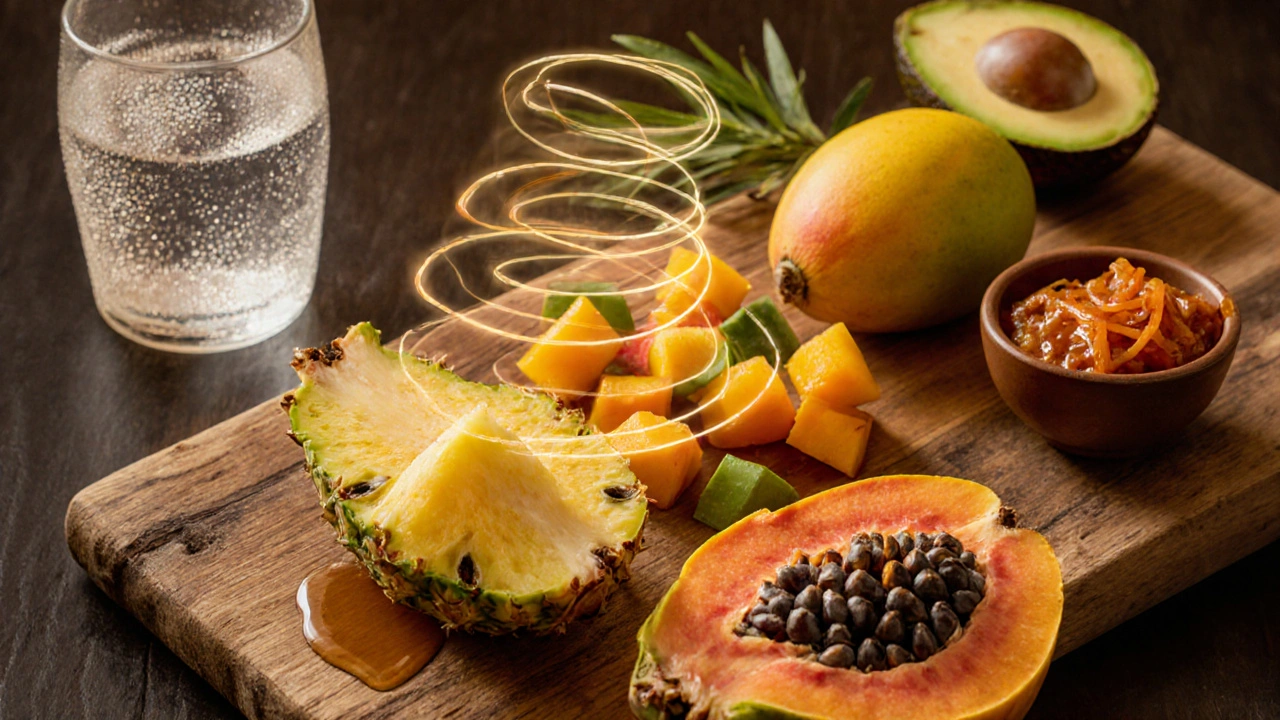
Natural Ways to Support Enzyme Production
Before reaching for pills, try these diet and lifestyle tweaks that encourage your body to make enough enzymes on its own.
- Chew Thoroughly - Mechanical breakdown increases surface area, letting enzymes work faster.
- Eat Enzyme‑Rich Foods - Pineapple (bromelain), papaya (papain), mango, honey, and fermented foods such as kimchi and sauerkraut provide pre‑formed enzymes.
- Include Healthy Fats - Moderate amounts of avocado, olive oil, and nuts stimulate the pancreas to release lipase.
- Stay Hydrated - Water facilitates enzyme transport and prevents sludge in the gut.
- Limit Alcohol and Processed Sugars - Both can irritate the pancreas and blunt enzyme output.
- Manage Stress - Chronic cortisol spikes interfere with digestive hormone signaling.
Adding a daily serving of fermented probiotics beneficial bacteria that help maintain gut lining health can also improve the environment where enzymes do their work.
When Supplements Make Sense
Sometimes diet alone can’t close the gap, especially for people with chronic pancreatitis, cystic fibrosis, or age‑related enzyme decline. In those cases, targeted enzyme supplements over‑the‑counter blends that contain amylase, protease, and lipase can be a game‑changer.
Key tips for choosing a supplement:
- Look for enteric‑coated capsules that survive stomach acid and release enzymes in the small intestine.
- Check the label for the exact enzyme units (e.g., 30,000 IU lipase) - higher numbers aren’t always better; they should match your specific need.
- Choose products free from unnecessary fillers, dyes, or allergens.
- Start with a low dose taken with the largest meal of the day, then adjust based on symptom relief.
If you’re pregnant, nursing, or on medication (especially blood thinners), consult a healthcare professional before adding any supplement.
Comparison of Common Digestive Enzymes
| Enzyme | Primary Substrate | Source (Body) | Typical Deficiency Symptoms | Food Sources (External) |
|---|---|---|---|---|
| Amylase | Starches & complex carbs | Salivary glands & pancreas | Bloating, excess gas, low blood sugar | Pineapple, malted barley, honey |
| Protease | Proteins | Pancreas & stomach lining | Undigested protein in stool, muscle loss | Papaya, kiwi, fermented soy (miso) |
| Lipase | Fats (triglycerides) | Pancreas | Fatty stools, vitaminA/D/E/K deficiencies | Avocado, olive oil, nuts, fermented dairy |
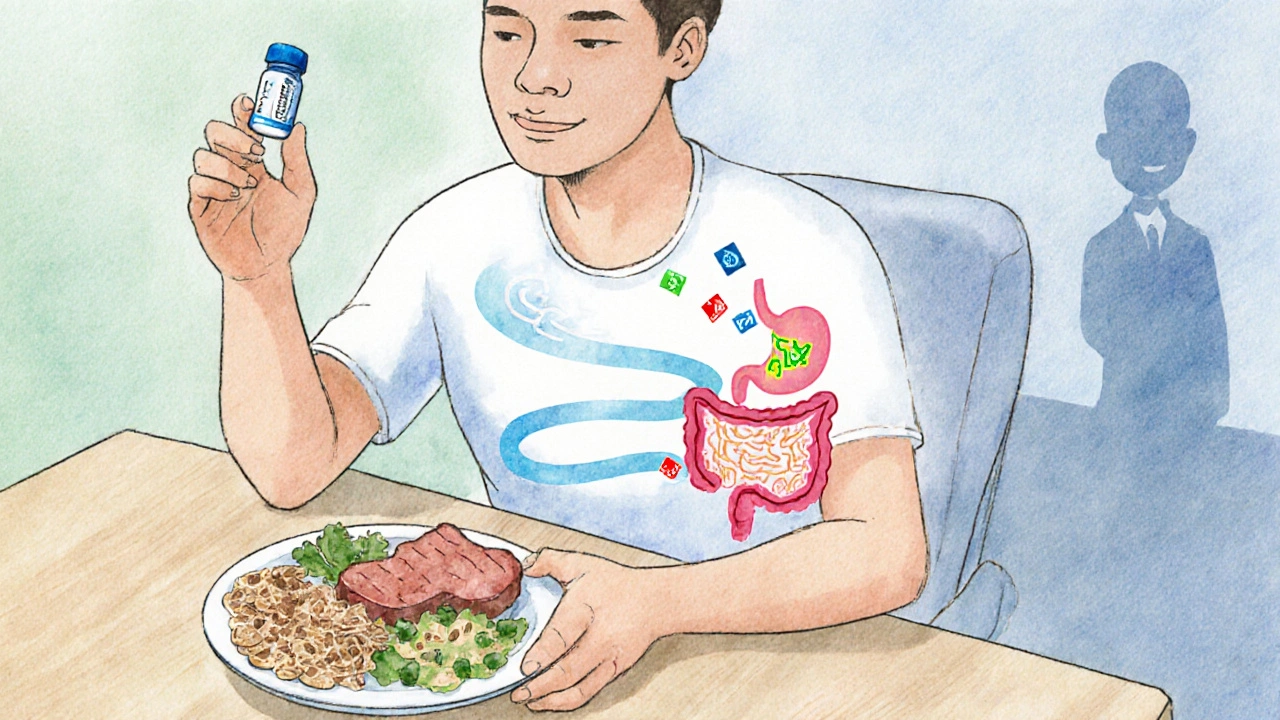
Practical Checklist to Prevent Poor Absorption
- Chew each bite 20-30 times.
- Include at least one enzyme‑rich food daily.
- Drink 8‑10 glasses of water spread throughout the day.
- Avoid large meals late at night; give the gut time to work.
- Take a low‑dose, enteric‑coated enzyme supplement with your biggest meal if you have persistent symptoms.
- Schedule a check‑up if symptoms last more than two weeks despite changes.
Next Steps & Troubleshooting
If you’ve tried the natural tweaks and still feel off, here’s what to do next:
- Track Your Meals - Write down what you ate, when, and any symptoms. Patterns often reveal the culprit.
- Test for Underlying Conditions - Conditions like celiac disease, lactose intolerance, or pancreatic insufficiency require medical testing.
- Adjust Supplement Timing - Some people benefit from taking enzymes before the meal; others need them mid‑meal.
- Consult a Specialist - A gastroenterologist can run stool fat tests or breath tests to pinpoint malabsorption.
Remember, your gut is a dynamic ecosystem. Small, consistent changes usually outperform drastic overhauls.
Frequently Asked Questions
Can I get enough enzymes from food alone?
For most healthy adults, a balanced diet that includes enzyme‑rich foods (like pineapple, papaya, kefir, and fermented vegetables) supplies sufficient enzymes. However, people with chronic pancreatic issues or older adults may still need a supplement.
Do enzyme supplements cause side effects?
When taken as directed, most people experience mild digestive improvement. Rarely, high doses can cause abdominal cramps or diarrhea. If you notice any discomfort, lower the dose or try a different formulation.
Is digestive enzymes the same as probiotics?
No. Enzymes are proteins that break down food, while probiotics are live bacteria that support gut flora. Both are important, but they work in different ways.
How long does it take to notice improvement after starting enzymes?
Most people feel less bloating and better energy within a few days. Full nutrient absorption benefits may take 2‑4 weeks of consistent use.
Are there any foods that should be avoided while using enzyme supplements?
Not really, but highly processed, fried, or overly fatty meals can overwhelm even supplemental enzymes. Pairing supplements with balanced meals yields the best results.
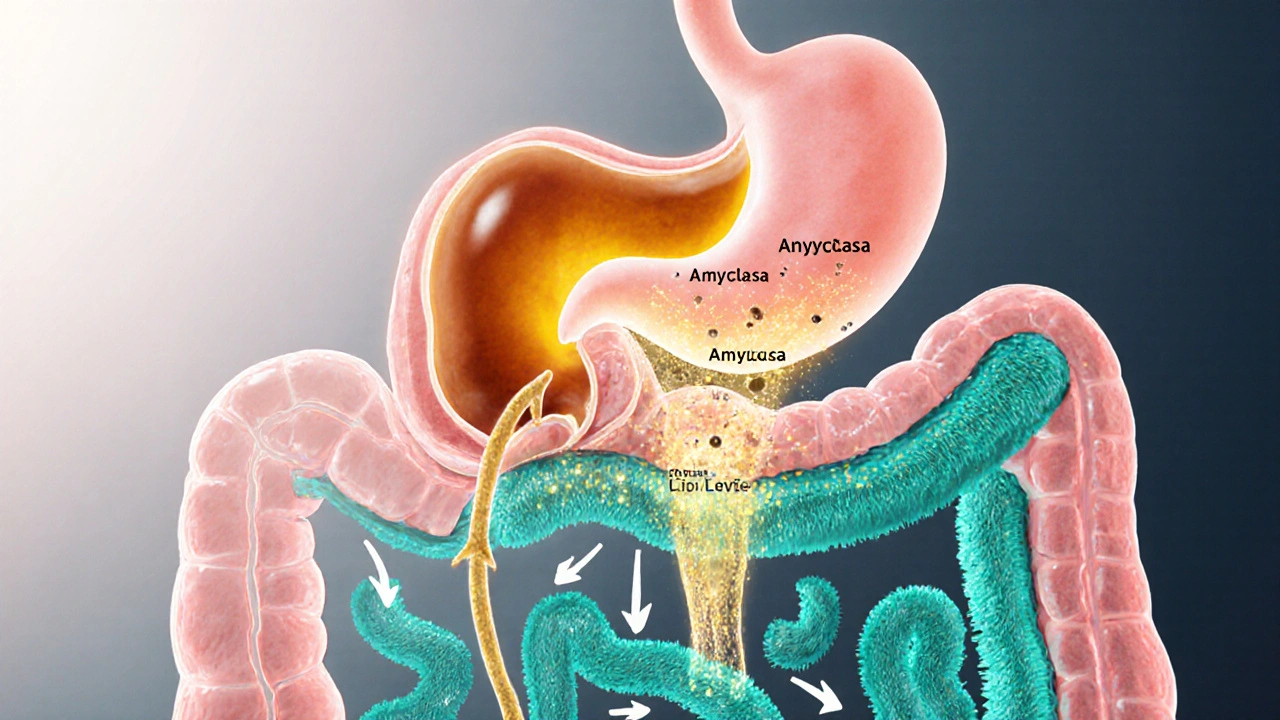
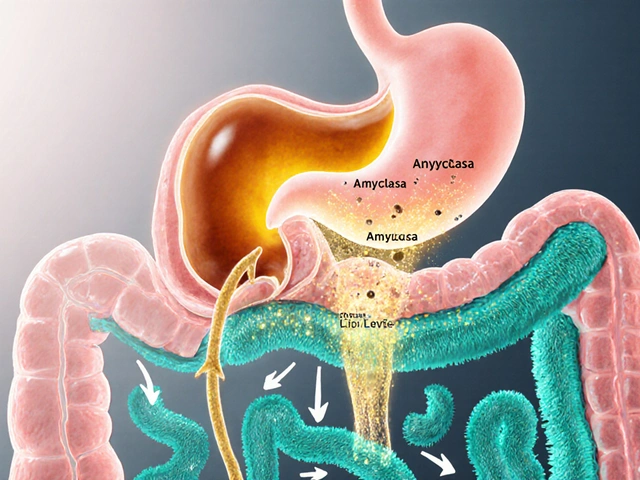

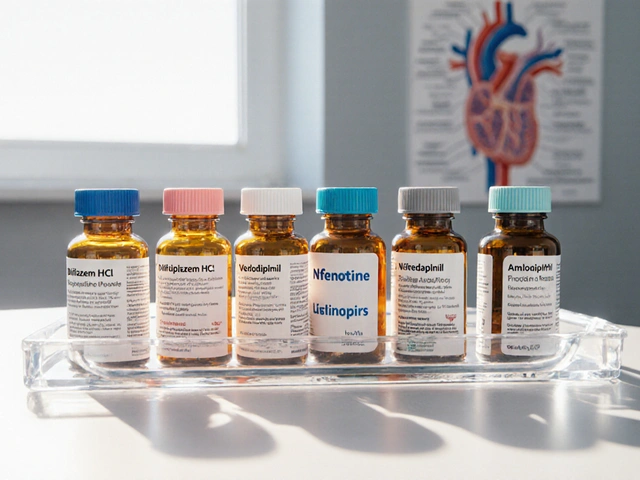


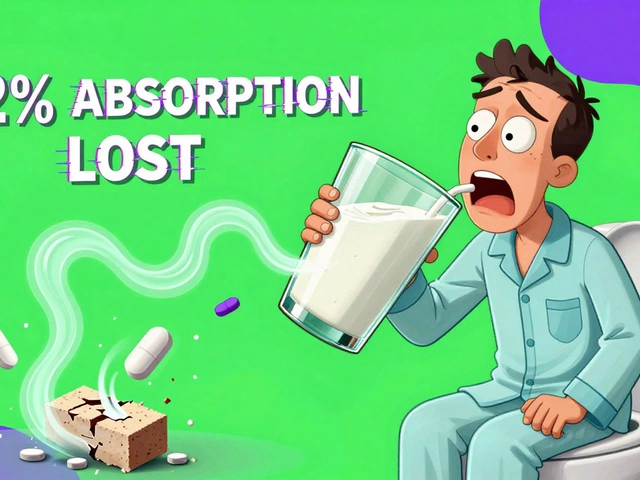
Iain Clarke
October 14, 2025 AT 16:50Chewing each bite thoroughly is a simple habit that gives enzymes a larger surface area to work on, which can cut down on bloating and improve nutrient uptake. Including pineapple, papaya, or a spoonful of fermented kimchi in your meals supplies pre‑formed enzymes that support the body's own production. Staying well‑hydrated helps transport these enzymes through the gut, so aim for at least eight glasses of water daily. Limiting alcohol and highly processed sugars reduces pancreatic stress, keeping enzyme output steady. If symptoms persist, a low‑dose, enteric‑coated supplement taken with the biggest meal of the day can bridge the gap without overwhelming your system.
Courtney Payton
October 22, 2025 AT 16:50One cannot ignore the moral implications of a diet saturated with artificial additives; we are, in effect, sabotaging the very enzymes our bodies rely upon. The modern fast‑food culture decidedly undermines the natural symbiosis between food and digestion, leading many to suffer in silence. While the science is clear-enzyme deficiency manifests as fatigue, gas, and weight loss-society often dismisses these signs as mere inconvenience. It is downright irresponsible to promote processed meals without acknowledging the hidden enzymatic cost. If we truly value health, we must champion whole‑food choices and educate others about the quiet tyranny of enzyme depletion.
Charmaine De Castro
October 30, 2025 AT 15:50Hey there! 🌿 Adding a splash of mango or a dollop of kefir to breakfast can sprinkle some extra amylase and protease right where you need them. I’ve found that a quick 30‑second chew before swallowing lets saliva‑borne amylase start the carb breakdown early, which eases the load on the pancreas later on. Don’t forget to sip water throughout the day; it’s the highway that carries those enzymes to the small intestine. If you’re feeling a bit sluggish after meals, try a small handful of soaked almonds-they’re gentle on digestion and packed with healthy fats that cue lipase release. Stay curious and keep listening to what your gut is telling you!
Mark Mendoza
November 7, 2025 AT 15:50Enzyme timing can be a subtle art; some folks feel better taking supplements just before a meal, while others prefer mid‑meal for the best overlap. 🤔 It often comes down to personal rhythm, so a short food‑symptom journal can reveal your sweet spot. Remember, consistency beats occasional mega‑doses-steady, low‑dose use typically yields smoother digestion over weeks. 🧭
Dan Tourangeau
November 15, 2025 AT 15:50Great summary!
Bernard Valentinetti
November 23, 2025 AT 15:50Ah, the ever‑glittering promise of “miracle enzymes,”-a phrase, I must say, that reeks, perhaps, of modern commercial hype, and yet, let us not dismiss outright the genuine biochemical marvel that these proteins represent; for, when administered rightly, they can, indeed, alleviate, the most stubborn of digestive woes, 😊, especially in those with pancreatic insufficiency, but-always-read the label, mind the enteric coating, and-most crucially-consult a qualified practitioner before embarking on any self‑prescribed regimen, lest you wander into the labyrinth of unnecessary supplementation.
Kenneth Obukwelu
December 1, 2025 AT 15:50Consider, if you will, the grand theatre of the gut: each enzyme a diligent actor, each bite a scene awaiting its cue. When the curtain lifts-chewing, salivation, gastric acids-the ensemble performs in perfect harmony, turning humble sustenance into vibrant life‑force. Yet, when a single player falters-be it amylase, protease, or lipase-the entire production teeters, leaving the audience (our bodies) bewildered, bloated, fatigued. Thus, honoring this delicate choreography with mindful eating, enzyme‑rich fare, and, when necessary, precise supplementation, restores the applause of health.
Josephine hellen
December 9, 2025 AT 15:50Embarking on the journey to better digestion is like planting a garden of vitality, and every seed you sow-whether a crisp apple, a spoonful of fermented sauerkraut, or a splash of pineapple juice-holds the promise of flourishing health. First, cherish the power of deliberate chewing; by breaking food down to a fine paste, you grant your enzymes the chance to mingle intimately with each molecule, setting the stage for optimal absorption. Next, celebrate the gifts of nature: papaya and kiwi deliver bromelain and actinidin, natural proteases that gently usher proteins toward assimilation. Hydration, often overlooked, serves as the river that carries these catalytic allies through the labyrinth of your intestines, so keep a water bottle close at hand throughout the day. When stress rears its head, remember that cortisol can sabotage digestive hormone signals, so practices like deep breathing, light movement, or a few minutes of mindfulness can safeguard your enzyme factory. Beware of the siren call of processed snacks laden with refined sugars and trans fats; they not only starve your gut of beneficial microbes but also overtax the pancreas, diminishing its enzyme output. If you notice lingering bloating, occasional loose stools, or an inexplicable dip in energy, consider a gentle trial of an enteric‑coated, broad‑spectrum enzyme supplement taken with your largest meal; start modestly and observe your body's response. In time, you may discover that your skin reflects this inner harmony-less dryness, fewer rashes, a radiant glow. Keep a simple journal of meals, symptoms, and any supplements; patterns will emerge, guiding you toward the foods that support your unique digestive rhythm. Remember, patience is key: while short‑term relief might appear within days, true, lasting improvement in nutrient uptake often blooms over weeks of consistent care. Celebrate each small victory, whether it's a smoother morning routine or a newfound zest during afternoon hikes, and let this momentum propel you toward a fuller, more energetic life.
Northern Lass
December 17, 2025 AT 15:50One must, with due solemnity, question the unbridled enthusiasm for over‑the‑counter enzyme preparations that flood the market, for such proliferations may mask a deeper capitulation to pharmaceutical commodification of natural physiology. While the biochemical role of amylase, protease, and lipase is incontrovertible, the indiscriminate ingestion of exogenous enzymes without rigorous diagnostic confirmation borders upon the folly of self‑prescription. Moreover, the oft‑unseen additives, fillers, and proprietary blends concealed within these capsules warrant a vigilant scrutiny, lest we unwittingly introduce novel antigens into our already complex gastroduodenal milieu. Hence, it is incumbent upon the discerning scholar to advocate for a measured, evidence‑based approach, privileging whole‑food enzymatic sources and personalized medical counsel over the seductive allure of mass‑produced supplements.
Johanna Sinisalo
December 25, 2025 AT 15:50While the concerns raised are certainly valid, it is also true that many individuals benefit from thoughtfully selected enzyme supplements, especially when guided by a healthcare professional. A balanced perspective acknowledges both the potential risks of unregulated products and the practical advantages they can offer to those with documented deficiencies. Encouraging patients to discuss their options with a qualified clinician helps ensure safe, targeted use that complements a nutrient‑rich diet.